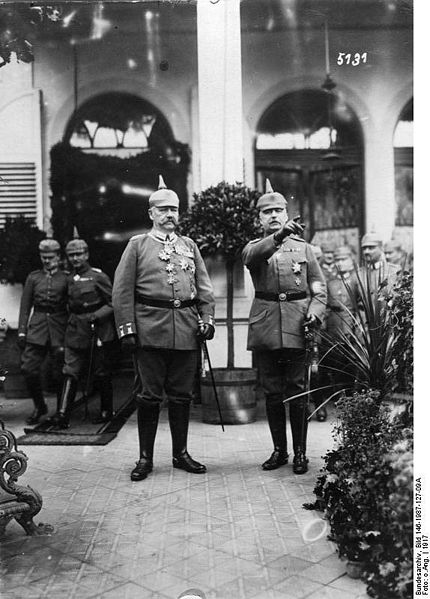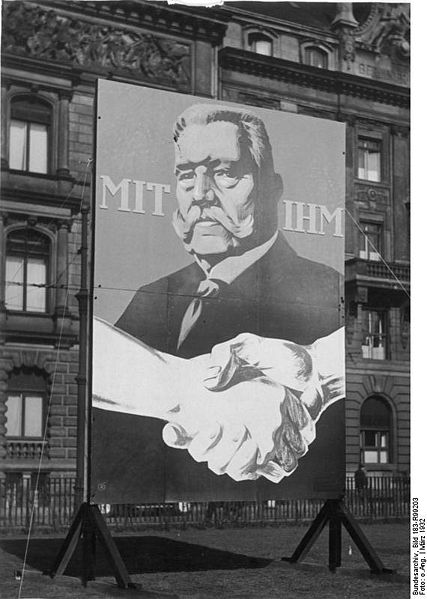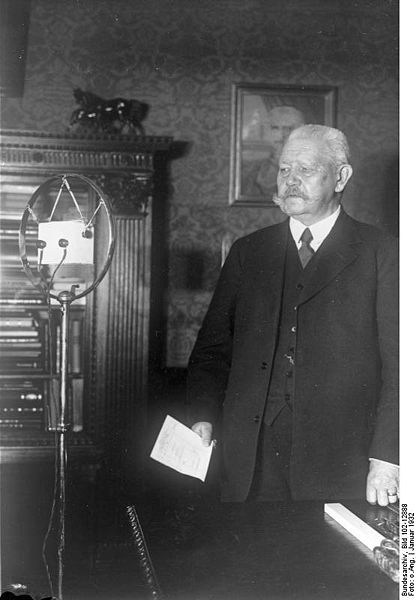<Back to Index>
- Philosopher and Politician Mohandas Karamchand Gandhi, 1869
- Painter Hans Thoma, 1839
- 2nd President of Germany Paul Ludwig Hans Anton von Beneckendorff und von Hindenburg, 1847
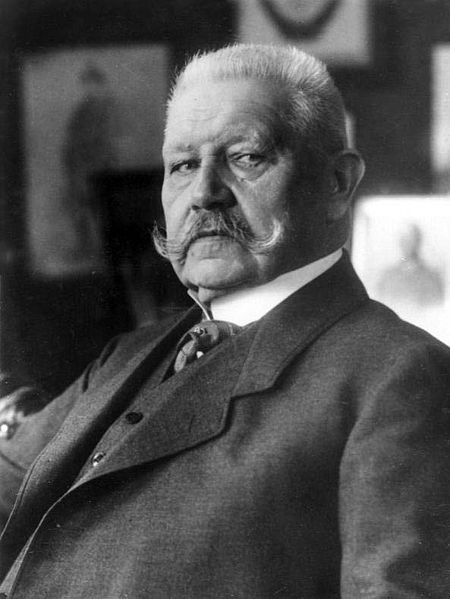
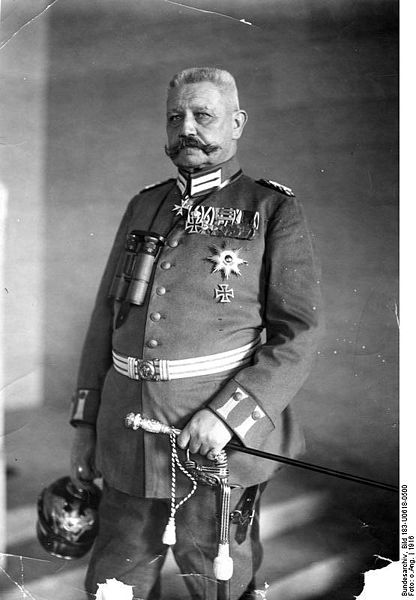
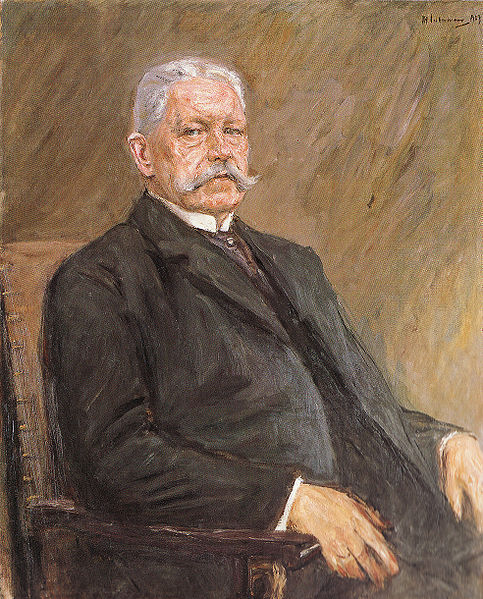
Paul Ludwig Hans Anton von Beneckendorff und von Hindenburg, known universally as Paul von Hindenburg (2 October 1847 – 2 August 1934) was a German field marshal, statesman, and politician, and served as the 2nd President of Germany from 1925 to 1934.
Hindenburg enjoyed a long and undistinguished career in the Prussian Army, eventually retiring in 1911. He was recalled at the outbreak of World War I, and first came to national attention, at the age of 66, as the victor at Tannenberg in 1914. As Germany's Chief of the General Staff from 1916, he and his deputy, Erich Ludendorff, rose in the German public's esteem until Hindenburg came to eclipse the Kaiser himself. Hindenburg retired again in 1919, but returned to public life one more time in 1925 to be elected as the second President of Germany. Though 84 years old and in poor health, Hindenburg was persuaded to run for re-election in 1932, as he was considered the only candidate who could defeat Adolf Hitler. Hindenburg was re-elected in a runoff but nonetheless played an important role in the Nazi Party's rise to power, dissolving parliament twice in 1932 and eventually appointing Hitler as Chancellor in January 1933. In February, he issued the Reichstag Fire Decree which suspended various civil liberties, and in March he signed the Enabling Act, in which parliament gave Hitler's administration legislative powers. Hindenburg died the following year, after which Hitler declared the office of President vacant and, as "Führer und Reichskanzler", made himself head of state. The famed zeppelin Hindenburg that was destroyed by fire in 1937 had been named in his honor, as was the Hindenburgdamm, a causeway joining the island of Sylt to mainland Schleswig-Holstein that was built during his time in office. The previously German Upper Silesian town of Zabrze (German: Hindenburg O.S.) was also renamed after him in 1915. SMS Hindenburg, a battle cruiser commissioned in the Imperial German Navy in 1917 and the last capital ship to enter service in the Imperial Navy, was also named after him.
Hindenburg was born in Posen, Prussia (modern day Poznań, Poland) on Podgórna street, the son of Prussian aristocrat Robert von Beneckendorff und von Hindenburg (1816 – 1902) and wife Luise Schwickart (1825 – 1893), the daughter of medical doctor Karl Ludwig Schwickart and wife Julie Moennich. Hindenburg was embarrassed by his mother's non-aristocratic background, and hardly mentioned her at all in his memoirs. His paternal lineage was considered highly distinguished. His paternal grandparents were Otto Ludwig von Beneckendorff und von Hindenburg (1778 – 18 July 1855), through whom he was remotely descended from the illegitimate daughter of Count Heinrich VI of Waldeck, and wife Eleonore von Brederlow (d. 18 February 1863). Hindenburg was also a direct descendant of Martin Luther and wife Katharina von Bora, through their daughter Margareta Luther. Hindenburg's younger brothers and sister were Otto, born 24 August, 1849, Ida, born 19 December, 1851 and Bernhard, born 17 January, 1859.
After his education at Wahlstatt (now Legnickie Pole) and Berlin cadet schools, he fought in the Austro-Prussian War (1866) and the Franco-Prussian War (1870–1871). Hindenburg was selected for prestigious duties: serving the widow of King Frederick William IV of Prussia,
being present - as one of a group of young officers decorated for
bravery in battle, who had been chosen to represent their regiments -
in the Palace of Versailles when the German Empire was proclaimed on 18 January, 1871, and as Honour Guard prior to the Military funeral of Emperor William I in
1888. Hindenburg remained in the army, eventually commanding a corps
and being promoted to General of Infantry (equivalent to a British or US lieutenant-general;
the German equivalent to four-star rank was Colonel-General) in 1903.
Meanwhile, he married Gertrud von Sperling, also an aristocrat, by whom
he had two daughters, Irmengard Pauline (1880) and Annemaria (1891) and
one son, Oskar (1883). Hindenburg retired from the army for the first time in 1910, but was recalled shortly after the outbreak of World War I in 1914 by the Chief of the General Staff, Helmuth von Moltke. Hindenburg was given command of the Eighth Army, then locked in combat with the First and Second Russian armies in East Prussia; after defeat by the Russian First Army at Gumbinnen, Hindenburg's predecessor Maximilian von Prittwitz had been planning to abandon East Prussia and retreat behind the River Vistula. Hindenburg's Eighth Army was victorious in the Battle of Tannenberg and the Battle of the Masurian Lakes against the Russian armies. Although historians attach much of the credit to Erich Ludendorff and to the then little-known staff officer Max Hoffmann,
these successes made Hindenburg a national hero. At the start of
November 1914 Hindenburg was given the position of Supreme Commander
East (Ober-Ost) – although at this stage his authority only extended over the German, not the Austro-Hungarian, portion of the front – and units were transferred from East Prussia to form a new Ninth Army in south-western Poland. Later in November 1914, after the Battle of Lodz, Hindenburg was promoted to the rank of field marshal. A further battle was fought by the Eighth and newly-formed Tenth Armies in Masuria that winter. Ober-Ost eventually
consisted of the German Eighth, Ninth and Tenth Armies, plus other
assorted corps. Hindenburg and Ludendorff felt that more effort should
be made on the Eastern Front in order to defeat Russia, although ironically the most spectacular victory of 1915, the Gorlice–Tarnów Offensive,
was won by Mackensen's German Eleventh Army fighting on the
Austro-Hungarian sector rather than as part of Hindenburg's command. By
contrast Erich von Falkenhayn,
the Chief of the General Staff, felt that it was impossible for Germany
to win a decisive victory, hoped that Russia might be encouraged to
drop out of the war if not pressed too hard, and in 1916 unleashed an offensive at Verdun designed to "bleed France white" and encourage her to make peace. Though
Hindenburg was only average in terms of military ability, he had a team
of talented and able subordinates who won him a series of great
victories on the Eastern Front between 1914-1916. These victories
transformed Hindenburg into Germany's most popular man. During the war,
Hindenburg was the subject of an enormous personality cult. He was seen
as the perfect embodiment of German manly honour, rectitude, decency
and strength. The appeal of the Hindenburg cult cut across ideological,
religious, class and regional lines, but the group that idolized
Hindenburg the most were the German right who saw him as an ideal representative of the Prussian ethos and of Lutheran, Junker values.
During the war, there were wooden statues of Hindenburg built all over
Germany, onto which people nailed money and cheques for war bonds. It
was a measure of Hindenburg's public appeal that when the Government
launched an all-out programme of industrial mobilisation in 1916, the
programme was named the Hindenburg Programme. Before 1914, any such
programme would have been named the Kaiser Wilhelm Programme. By the summer of 1916 Erich von Falkenhayn had
been discredited by the bogging-down of the Verdun Offensive and the
near-collapse of the Austro-Hungarian Army caused by the Brusilov Offensive and the entry of Romania into the war on
the Allied side. In August Hindenburg succeeded him as Chief of the
General Staff, although real power was exercised by his deputy, Erich Ludendorff.
Hindenburg in many ways served as the real Commander -in - chief of the
German armed forces instead of the Kaiser who had been reduced to a
mere figurehead while Ludendorff served as the de facto general chief
of staff. From 1916 onwards, Germany became an unofficial military
dictatorship, often called the "Silent dictatorship" by historians. In September 1918, Ludendorff advised seeking an armistice with the Allies,
but in October, changed his mind and resigned in protest. Ludendorff
had expected Hindenburg to follow him by also resigning, but Hindenburg
refused on the grounds that in this hour of crisis, he could not desert
the men under his command. Ludendorff never forgave Hindenburg for
this. Ludendorff was succeeded by Wilhelm Groener, a staff officer who served as Hindenburg's assistant until 1932. In
November 1918, Hindenburg and Groener played a decisive role in
persuading the Kaiser Wilhelm II to abdicate for the greater good of Germany. Hindenburg, who was a firm monarchist throughout
his life, always regarded this episode with considerable embarrassment,
and almost from the moment the Kaiser abdicated, Hindenburg insisted
that he had played no role in the abdication and assigned all of the
blame to Groener. Groener, for his part, went along in order to protect
Hindenburg's reputation. At
the conclusion of the war Hindenburg retired a second time, and
announced his intention to retire from public life. In 1919, Hindenburg
was called before a Reichstag Commission
that was investigating the responsibility for both the outbreak of war
in 1914 and for the defeat in 1918. Hindenburg had not wanted to appear
before the commission, and had been subpoenaed.
The appearance of Hindenburg before the commission was an eagerly
awaited public event. Ludendorff, who had fallen out with Hindenburg
over the decision to continue seeking the armistice in October 1918,
was concerned that Hindenburg might reveal that it was he who had
advised seeking an armistice in September 1918. Ludendorff wrote a
letter to Hindenburg, informing him that he was writing his memoirs and
threatened to expose the fact that Hindenburg did not deserve the
credit that he had received for his victories. Ludendorff's letter went
on to suggest that how Hindenburg testified would determine how
favorably Ludendorff would present Hindenburg in his memoirs. When
Hindenburg did appear before the commission, he refused to answer any
questions about the responsibility for the German defeat, and instead
read out a prepared statement that had been reviewed in advance by
Ludendorff's lawyer. Hindenburg testified that the German Army had been
on the verge of winning the war in the fall of 1918, and that the
defeat had been precipitated by a Dolchstoß ("stab in the back") by disloyal elements on the home front and by unpatriotic politicians. Despite being threatened with a contempt citation
for refusing to respond to questions, Hindenburg simply walked out of
the hearings after reading his statement. Hindenburg's status as a war
hero provided him with a political shield and he was never prosecuted. Hindenburg's testimony was the first use of the Dolchstoß legende.
The field marshal credited an unnamed British general for first
uttering the phrase, and the term was adopted by nationalist and
conservative politicians who sought to blame the socialist founders of the Weimar Republic for the loss of the war. Afterwards, Hindenburg had his memoirs entitled Mein Leben (My Life) ghost-written in 1919-20. Mein Leben was a huge bestseller in Germany, but was dismissed by most military historians and critics as a boring apologia that
skipped over the most controversial issues in Hindenburg's life.
Afterwards, Hindenburg retired from most public appearances and spent
most of his time with his family. A widower, Hindenburg was very close
to his only son, Major Oskar von Hindenburg and his granddaughters. In
1925, Hindenburg had no interest in running for public office. In the
first round of the presidential elections held on 29 March 1925, no
candidate had emerged with a majority and a run-off election had been
called. The Social Democratic candidate, Prime Minister Otto Braun of Prussia, had agreed to drop out of the race and had endorsed the Catholic Centre Party's candidate, Wilhelm Marx. Since Karl Jarres, the joint candidate of the two conservative parties, the German People's Party (DVP) and the German National People's Party (DNVP), was regarded as too dull, it seemed likely that Marx would win. Admiral Alfred von Tirpitz, one of the leaders of the DNVP, visited Hindenburg and urged him to run. Hindenburg
initially demurred, but under strong pressure from Tirpitz applied over
several meetings, broke down and agreed to run. Though Hindenburg ran
during the second round of the elections as a non-party independent, he
was generally regarded as the conservative candidate.
Largely because of his status as Germany's greatest war hero,
Hindenburg won the election in the second round of voting held on April
26, 1925. He was aided by the support of the Bavarian People's Party (BVP), which switched its support from Marx, and the refusal of the Communist Party of Germany (KPD) to withdraw its candidate, Ernst Thälmann. Hindenburg
took office on 12 May 1925. For the first five years after taking
office, Hindenburg fulfilled his duties of office with dignity and
decorum. For the most part, Hindenburg refused to allow himself to be
drawn into the maelstrom of German politics in the period, and sought
to play the role of a republican equivalent of a constitutional
monarch. Although often referred to as the Ersatzkaiser (substitute Emperor), Hindenburg made no effort to restore the monarchy and took his oath to the Weimar Constitution seriously. In
private, Hindenburg often complained that he missed the quiet of his
retirement and bemoaned that he had allowed himself to be pressured
into running for President. Hindenburg carped that politics was full of
issues such as economics that
he did not, and did not want to, understand. He was surrounded,
however, by a coterie of advisers antipathetic to the Weimar
constitution. These advisers included his son, Oskar, Otto Meißner, General Wilhelm Groener, and General Kurt von Schleicher. This group were known as the Kamarilla. The younger Hindenburg served as his father's aide-de-camp and controlled politicians' access to the President. Schleicher was a close friend of Oskar and came to enjoy privileged access to Hindenburg. It was he who came up with the idea of Presidential government based on the so-called "25/48/53 formula". Under a "Presidential" government the head of government (in this case, the chancellor), is responsible to the head of state,
and not a legislative body. The "25/48/53 formula" referred to the
three articles of the Constitution that could make a "Presidential
government" possible: Schleicher's
idea was to have Hindenburg appoint a man of Schleicher's choosing as
chancellor, who would rule under the provisions of Article 48. If the Reichstag should threaten to annul any laws so passed, Hindenburg could counter with the threat of dissolution.
Hindenburg was unenthusiastic about these plans, but was pressured into
going along with them by his son along with Meissner, Groener and
Schleicher. The
first attempt to establish a "presidential government" had occurred in
1926–1927, but foundered for lack of political support. During the
winter of 1929–1930, however, Schleicher had more success. After a
series of secret meetings attended by Meissner, Schleicher, and Heinrich Brüning, the parliamentary leader of the Catholic Center Party (Zentrum),
Schleicher and Meissner were able to persuade Brüning to go along
with the scheme for "presidential government". How much Brüning
knew of Schleicher's ultimate objective of dispensing with democratic
governance is unclear. Schleicher maneuvered to exacerbate a bitter
dispute within the "Grand Coalition" government of the Social Democrats and the German People's Party over
whether the unemployment insurance rate should be raised by a half
percentage point or a full percentage point. The upshot of these
intrigues was the fall of Müller’s government in March 1930 and
Hindenburg's appointment of Brüning as Chancellor. Brüning's
first official act was to introduce a budget calling for steep spending
cuts and steep tax increases. When the budget was defeated in July
1930, Brüning arranged for Hindenburg to sign the budget into law
by invoking Article 48. When the Reichstag voted to repeal the budget,
Brüning had Hindenburg dissolve the Reichstag, just two years into
its mandate, and reapprove the budget through the Article 48 mechanism.
In the September 1930 elections the Nazis achieved an electoral breakthrough, gaining 17 percent of the vote, up from 2 percent in 1928. The Communist Party of Germany also made striking gains, albeit not so great. After
the 1930 elections, Brüning continued to govern largely through
Article 48; his government was kept afloat by the support of the Social
Democrats who voted not to cancel his Article 48 bills in order not to
have another election that could only benefit the Nazis and the
Communists. Hindenburg for his part grew increasingly annoyed at
Brüning, complaining that he was growing tired of using Article 48
all the time to pass bills. Hindenburg found the detailed notes that
Brüning submitted explaining the economic necessity of each of his
bills to be incomprehensible. Brüning continued with his policies
of raising taxes and cutting spending to address the onset of the Great Depression; the only areas in which government spending increased were the military budget and the subsidies for Junkers in the so-called Osthilfe (Eastern Aid) program. Both of these spending increases reflected Hindenburg's concerns. In October 1931, Hindenburg and Adolf Hitler had
their first meeting. Both men took an immediate dislike to each other.
In private, Hindenburg disparagingly referred to Hitler as "that Austrian corporal", or "the Bohemian corporal" and sometimes just simply as "the corporal", while Hitler often described Hindenburg as "that old fool" and "the old reactionary".
Until January 1933, Hindenburg often stated that he would never appoint
Hitler as Chancellor under any circumstances. On 26 January 1933,
Hindenburg privately told a group of his friends: "Gentlemen, I hope
you will not hold me capable of appointing this Austrian corporal to be
Reich Chancellor". By January 1932, at 84-years-old, Hindenburg was now lapsing in and out of senility and wanted to leave office as soon as his seven-year presidential term was over, but he was persuaded to run for re-election in 1932 by the Kamarilla and the pro-republican parties who
considered him the only candidate who could defeat Hitler. Hindenburg
reluctantly agreed to stay in office, but wanted to avoid an election.
The only way this was possible was for the Reichstag to vote to cancel the election with a two-thirds supermajority. Since the Nazis were
the second-largest party, their co-operation was vital if this was to
be done. Brüning met with Hitler in January 1932 to ask if he
would agree to the President's demand to forgo the election. Hitler
stated he would only if Brüning would fulfill a set of impossible
demands. Brüning
rejected Hitler's demands as totally outrageous and unreasonable. By
this time, Schleicher had decided that Brüning had become an
obstacle to his plans and was already plotting Brüning's downfall.
Schleicher convinced Hindenburg that the reason why Hitler had rejected
Brüning's offer was because Brüning had deliberately
sabotaged the talks to force the elderly president into a grueling
re-election battle. During the election campaign of 1932, Brüning
had campaigned hard for Hindenburg's re-election. As Hindenburg was in
bad health and a poor speaker in any case, the task of traveling the
country and delivering speeches for Hindenburg had fallen upon
Brüning. Hindenburg’s campaign appearances usually consisted
simply of appearing before the crowd and waving to them without
speaking. In the first round of the election held in March 1932, Hindenburg emerged as the frontrunner, but failed to gain a majority. In the runoff election of
April 1932, Hindenburg defeated Hitler for the Presidency. After the
presidential elections had ended, Schleicher held a series of secret
meetings with Hitler in May 1932, and thought that he had obtained a
"gentleman's agreement" in which Hitler had agreed to support the new
"presidential government" that Schleicher was building. At the same
time, Schleicher, with Hindenburg's complicit consent, had set about
undermining Brüning's government. The
first blow occurred in May 1932, when Schleicher had Hindenburg dismiss
Groener as Defense Minister in a way that was designed to humiliate
both Groener and Brüning. On 31 May 1932, Hindenburg dismissed
Brüning as Chancellor and replaced him with the man that
Schleicher had suggested, Franz von Papen.
"The Government of Barons", as Papen's government was known, openly had
as its objective the destruction of German democracy. Like
Brüning's government, Papen's government was a "presidential
government" that governed through the use of Article 48. Unlike
Brüning, Papen ingratiated himself to Hindenburg and his son
through flattery. Much to Schleicher's annoyance, Papen quickly
replaced him as Hindenburg's favorite advisor. The French Ambassador André François-Poncet reported to his superiors in Paris that
"It's he [Papen] who is the preferred one, the favorite of the Marshal;
he diverts the old man through his vivacity, his playfulness; he
flatters him by showing him respect and devotion; he beguiles him with
his daring; he is in [Hindenburg's] eyes the perfect gentleman." In
accordance with Schleicher's "gentleman's agreement", Hindenburg
dissolved the Reichstag and set new elections for July 1932. Schleicher
and Papen both believed that the Nazis would win the majority of the
seats and would support Papen's government. Hitler staged an electoral
comeback, with his Nazi party winning a solid plurality of seats in the Reichstag.
Following the Nazi electoral triumph in the Reichstag elections held on
31 July 1932, there were widespread expectations that Hitler would soon
be appointed Chancellor. Moreover, Hitler repudiated the "gentleman's
agreement" and declared that he wanted the Chancellorship for himself.
In a meeting between Hindenburg and Hitler held on 13 August 1932, in
Berlin, Hindenburg firmly rejected Hitler's demands for the
Chancellorship. The minutes of the meeting were kept by Otto Meißner, the Chief of the Presidential Chancellery. According to the minutes: The Reich
President in reply said firmly that he must answer this demand with a
clear, unyielding "No". He could not justify before God, before his
conscience, or before the Fatherland the transfer of the whole
authority of government to a single party, especially to a party that
was biased against people who had different views from their own. There
were a number of other reasons against it, upon which he did not wish
to enlarge in detail, such as fear of increased unrest, the effect on
foreign countries, etc. Herr Hitler repeated that any other solution was unacceptable to him. To this the Reich President replied: "So you will go into opposition?" Hitler: "I have now no alternative". After refusing Hitler’s demands for the Chancellorship, Hindenburg had a press release issued
of his meeting with Hitler that implied that Hitler had demanded
absolute power and had his knuckles rapped by the President for making
such a demand. Hitler was enraged by this press release. However, given
Hitler’s determination to take power legally, Hindenburg’s refusal to
appoint him Chancellor was an impassable quandary for Hitler. When the Reichstag convened in September 1932, its first and only act was to pass a massive vote of no-confidence in
Papen’s government. In response, Papen had Hindenburg dissolve the
Reichstag for elections in November 1932. The second Reichstag
elections saw the Nazi vote drop from 37 percent to 32 percent, though
the Nazis once again remained the largest party in the Reichstag. After
the November elections, there ensued another round of fruitless talks
between Hindenburg, Papen, Schleicher on the one hand and Hitler and
the other Nazi leaders on the other. The
President and the Chancellor wanted Nazi support for the "Government of
the President's Friends"; at most they were prepared to offer Hitler
the meaningless office of Vice-Chancellor. On 24 November 1932, during
the course of another Hitler-Hindenburg meeting, Hindenburg stated his
fears that " ... a presidential cabinet led by Hitler would necessarily
develop into a party dictatorship with all its consequences for an
extreme aggravation of the conflicts within the German people". Hitler
for his part, remained adamant that Hindenburg give him the
Chancellorship and nothing else. These demands were incompatible and
unacceptable to both sides and the stalemate continued. To break the
political stalemate, Papen proposed that Hindenburg declare martial law and do away with democracy via a presidential coup.
Papen won over Oskar Hindenburg with this idea and the two persuaded
Hindenburg for once to forgo his oath to the Constitution and go along
with this plan. Schleicher, who had come to see Papen as a threat,
blocked the martial law move by unveiling the results of a war games exercise that showed if martial law was declared, the Nazi SA and the Communist Red Front Fighters would rise up, the Poles would invade and the Reichswehr would be unable to cope. Whether
this was the honest result of a war games exercise or just a
fabrication by Schleicher to force Papen out of office is a matter of
some historical debate. The opinion of most leans towards the latter,
for in January 1933 Schleicher would tell Hindenburg that new war games
had shown the Reichswehr would
crush both the SA and Red Front Fighters and defend the eastern borders
from a Polish invasion. The results of the war games forced Papen to
resign in December 1932 in favor of Schleicher. Hindenburg was most
upset at losing his favorite Chancellor, and suspecting that the war
games were faked to force Papen out, came to bear a grudge against
Schleicher. Papen
for his part, was determined to get back into office and on 4 January
1933, Papen met with Hitler to discuss how they could bring down
Schleicher’s government, though the talks were inconclusive largely
because Papen and Hitler each coveted the Chancellorship for himself.
However, Papen and Hitler agreed to keep talking. Ultimately, Papen
came to believe that he could control Hitler from behind the scenes and
decided to support him for Chancellor. Papen then persuaded Meissner
and the younger Hindenburg of the merits of his plan, and the three
then spent the second half of January pressuring Hindenburg into naming
Hitler as Chancellor. Hindenburg was most loath to consider Hitler as
Chancellor and preferred that Papen hold that office instead. However,
the pressure from Meißner, Papen and the younger Hindenburg was
relentless and by the end of January, the President had decided to
appoint Hitler Chancellor. On the morning of 30 January 1933,
Hindenburg swore Hitler in as Chancellor at the Presidential Palace. Hindenburg played a supporting but key role in the Nazi Machtergreifung (Seizure
of Power) in 1933. In the "Government of National Concentration" headed
by Hitler, the Nazis were in the minority. Besides Hitler, the only
other Nazi ministers were Hermann Göring and Wilhelm Frick.
Frick held the then-powerless Interior Ministry, while Göring was
given no portfolio. Most of the other ministers were hold-overs from
the Papen and Schleicher governments, and the ones who were not, such as Alfred Hugenberg of the DNVP,
were not Nazis. This had the effect of assuring Hindenburg that the
room for radical moves on the part of the Nazis was limited. Moreover,
Hindenburg's favorite politician, Papen, was Vice Chancellor of the
Reich and Minister-President of Prussia. Hitler's first act as Chancellor was to ask Hindenburg to dissolve the Reichstag so that the Nazis and DNVP could increase their number of seats and pass the Enabling Act.
Hindenburg agreed to this request. In early February 1933, Papen asked
for and received an Article 48 bill signed into law that sharply limited freedom of the press. After the Reichstag fire, Hindenburg, at Hitler's urging, signed into law the Reichstag Fire Decree. This decree suspended all civil liberties in Germany. At the opening of the new Reichstag on
21 March 1933, at the Kroll Opera House, the Nazis staged an elaborate
ceremony, in which Hindenburg played the leading part, that was meant
to mark the continuity between the Prussian-German tradition and the
new Nazi state. The ceremony at the Kroll Opera House had the effect of
reassuring many Germans, especially conservative Germans, that life would be fine under the new regime. On 23 March 1933, Hindenburg signed the Enabling Act of 1933 into law, which gave decrees issued by the cabinet (in effect, Hitler) the force of law. Though
Hindenburg was in increasingly bad health, the Nazis made sure that
whenever Hindenburg did appear in public it was in Hitler’s company.
During these appearances, Hitler always made a point of showing the
utmost respect and reverence for the President. In private, Hitler
continued to detest Hindenburg, and expressed the hope that "the old
reactionary" would die as soon as possible, so that Hitler could merge
the offices of Chancellor and President into one. Hitler
was always very conscious of the fact that the President was the
Supreme Commander-In-Chief of the German armed forces, and that given
that Hindenburg was a revered figure in the German Army, that if the President decided to sack Hitler as Chancellor, there was little doubt that the Reichswehr would side with Hindenburg. Thus, as long as Hindenburg lived, Hitler was always very careful to avoid offending him. The only time Hindenburg ever objected to a Nazi bill occurred in early April 1933. The Reichstag had passed a Law for the Restoration of the Professional Civil Service that called for the immediate sacking of all Jewish civil servants at the Reich, Land,
and municipal levels. Hindenburg refused to sign this bill into law
until it had been amended to exclude all Jewish veterans of World War
I, Jewish civil servants who served in the civil service during the war
and those Jewish civil servants whose fathers were veterans. Hitler
amended the bill to meet Hindenburg’s objections, and was later to be
surprised at the number of Jews whose jobs were protected by the amendments. Hindenburg remained in office until his death at the age of 86 from lung cancer at his home in Neudeck, East Prussia on 2 August 1934 (exactly two months short of his 87th birthday). The day before Hindenburg's death, Hitler flew to Neudeck and visited him. Hindenburg, old and senile as well as bedridden from being very sick, thought he was meeting Kaiser Wilhelm II, and he called Hitler "Your Majesty" when Hitler first walked into his bedroom. Following
Hindenburg's death, Hitler merged the presidency with the office of
Chancellor under the title of Leader and Chancellor (Führer und Reichskanzler), making himself Germany's Head of State and Head of government, thereby completing the progress of Gleichschaltung.
This action effectively removed the last remedy by which Hitler could
be legally removed from office -- and with it, all institutional checks
and balances on his power. Hitler
had a plebiscite held on 19 August 1934, in which the German people
were asked if they approved of Hitler merging the two offices. The Ja (Yes) vote amounted to 90% of the vote. In
taking over the president's powers for himself without calling for a
new election, Hitler technically violated the provisions of the
Enabling Act. While the Enabling Act allowed Hitler to pass laws that
contravened the Weimar Constitution, it specifically forbade him from
interfering with the powers of the president. Moreover, the Weimar
Constitution had been amended in 1932 to make the president of the High
Court of Justice, not the chancellor, acting president pending new
elections. However, Hitler had become law unto himself by this time,
and no one dared object. Hindenburg himself was said to be a monarchist who favored a restoration of the German monarchy. Though he hoped one of the Prussian princes would be appointed to succeed him as Head of State,
he did not attempt to use his powers in favour of such a restoration,
as he considered himself bound by the oath he had sworn on the Weimar Constitution. It
has been alleged that Hindenburg’s will asked for Hitler to restore the
monarchy. However, the truth of this story cannot be established as
Oskar von Hindenburg destroyed the portions of his father’s will
relating to politics.
Hindenburg was buried in the Tannenberg Memorial near
Tannenberg, East Prussia (today: Stębark, Poland) against the wishes he
had expressed during his life. Hindenburg always said he wanted to be
buried next to his beloved wife. In 1945, German troops removed his and
his wife's coffins, to save them from the approaching Soviets, to Marburg an der Lahn in
western Germany (Hindenburg was an honorary citizen of this town). The
caskets of Hindenburg and his wife were found in an abandoned salt mine
on 27 April 1945 by U.S. Army Ordnance troops. Later that month, he and
his wife were interred anew in the famous Elisabeth Church in the North Tower Chapel. Will Lang, Jr., correspondent of Life, wrote an article (6 March 1950) about how the United States Army Ordnance troops found the coffins.
Although he was widely esteemed in his time, his biographers John Wheeler-Bennett and
Andreas Dorpalen have argued that beneath Hindenburg's façade of
strength and power was a weak-willed and not particularly intelligent
man who, while well-meaning, was highly dependent upon the advice of
others to make decisions. In Wheeler-Bennett's phrase, Hindenburg was a
"Wooden Titan".
“ Herr
Hitler declared that, for reasons which he had explained in detail to
the Reich President that morning, his taking any part in cooperation
with the existing government was out of the question. Considering the
importance of the National Socialist movement, he must demand the full
and complete leadership of the government and state for himself and his
party. ”
